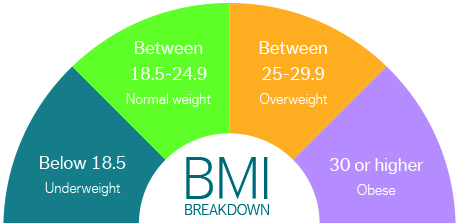You’re probably familiar with the term body mass index, or BMI. It’s a tool doctors use to determine if you’re at a healthy weight. Yet, your BMI doesn’t tell the whole story.
BMI is a calculation that uses your weight and height to measure overall body fat. Excess weight can lead to serious health problems such as diabetes and heart disease. Here’s where it gets confusing: you can have a high BMI and still be considered healthy.

That’s why your BMI shouldn’t be the only indicator of your health as it relates to your weight. It’s simply a starting point. Your doctor also looks at other factors, including skinfold thickness, lifestyle and diet. Body mass index is a good screening tool for obesity, but it’s not used to diagnose it. It helps doctors identify people who may be at risk.
Factors That Affect BMI
- Activity Level: It’s possible to have a normal BMI number but still carry a lot of body fat. Don’t base your health on your BMI number alone.
- Age: Some extra fat is normal as you age. However, a BMI of 30 or higher isn’t good.
- Body Shape: Where you carry body fat makes a difference. Belly fat increases your health risk.
- Muscle Mass: You can have a higher BMI number and be healthy if you have a lot of muscle. However, a BMI of 30 or higher is cause for concern.
Keep tabs on your BMI by asking about it during your annual visit to your primary care doctor.
Related Articles

March 9, 2020
3 Sneaky IBS Triggers
For people with irritable bowel syndrome, spring may spark a flare-up in symptoms

June 5, 2024
5 Consejos Sobre Nutricion para un Estilo de Vida Mas Saludable
Una alimentación saludable y una nutrición adecuada desempeñan un parte importante a la hora de mantener una buena salud. Aquí le mostramos cómo mejorar sus hábitos nutricionales.

May 31, 2024
5 Nutrition Tips for a Healthier Lifestyle
Healthy eating and proper nutrition play a big part in maintaining good health. Here's how to improve your nutrition habits.


